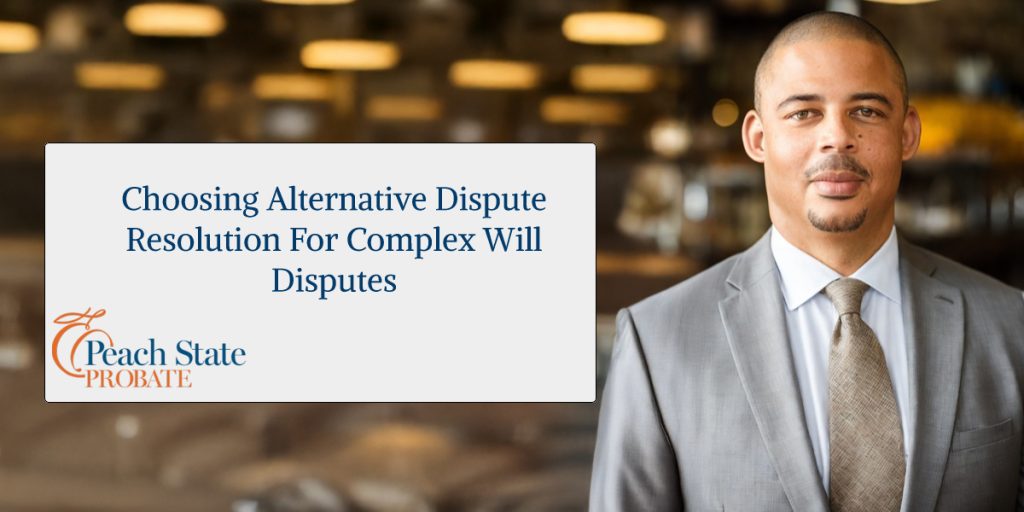## Exploring Alternative Dispute Resolution in Complex Will Disputes
In the realm of probate law, particularly in Georgia, the emergence of alternative dispute resolution (ADR) offers innovative solutions for resolving complex will disputes. As families navigate the emotional and legal intricacies of estate matters, ADR provides a pathway that can preserve relationships, save time, and reduce costs associated with traditional litigation. This article delves into the mechanics of alternative dispute resolution and its growing relevance in resolving disputes over wills in an effective manner.
ADR options such as mediation and arbitration can significantly ease the tension surrounding will disputes. Mediation allows parties to engage in open discussions with a neutral third-party facilitator who encourages dialogue and negotiation. This method fosters a collaborative environment for resolving conflicts without resorting to adversarial court proceedings. Arbitration, on the other hand, involves a structured hearing where an arbitrator delivers a binding decision. This flexibility and tailored approach make ADR increasingly valuable in probate cases, where emotions can run high, and litigation may exacerbate familial discord.
Investing in alternative dispute resolution for complex will disputes not only minimizes hostility but can also lead to more satisfactory and customized resolutions for all involved parties. Additionally, ADR processes are typically faster than court cases, offering a quicker resolution to what can often be a prolonged and painful process for families grieving the loss of a loved one. As more disputes turn toward mediation and arbitration, the legal landscape in Georgia is evolving, making ADR a necessary consideration for those involved in will disputes.
## Understanding Alternative Dispute Resolution
Alternative dispute resolution encompasses a variety of processes designed to resolve conflicts outside the traditional courtroom setting. This approach prioritizes collaboration and negotiation between parties rather than confrontation. The most common forms of ADR include mediation, arbitration, and collaborative law, each differing in its methodology and scope of resolution. The unique versatility of ADR allows it to adapt to the specific needs of individuals facing inheritance challenges.
Mediation fosters an environment where a third-party mediator assists parties in identifying their underlying interests and facilitates a conversation aimed at finding a mutually agreeable solution. Unlike litigation, mediation empowers the parties involved to have direct input in the outcome. This process often leads to improved communication and understanding — essential elements for family members dealing with sensitive estate matters.
Arbitration, in contrast, involves a more formal process similar to a court hearing. In this scenario, an arbitrator listens to both sides present their cases, evaluates the evidence, and renders a binding decision. While arbitration can seem more adversarial than mediation, it offers a quicker resolution than litigation, which seldom serves the best interest of already strained familial relationships.
## The Importance of Alternative Dispute Resolution in Probate Matters
The significance of alternative dispute resolution in the context of complex will disputes cannot be understated. As these matters often involve deep emotional ties and significant financial stakes, traditional litigation can create further rifts among family members. ADR provides a constructive outlet for resolving conflicts while maintaining relationships. In many instances, preserving family bonds is as critical as the legal outcome itself, especially when consider the emotional ramifications of inherited assets and the legacy of the deceased.
At its best, alternative dispute resolution keeps the process flexible and focuses on the interests of all parties involved. This results-oriented approach enables families to craft solutions uniquely tailored to their situations, which could be unfeasible in a court setting. For instance, ADR can accommodate a variety of family dynamics and interests while prioritizing healing and reconciliation, making it more appealing for those unwilling to engage in contentious court battles.
Moreover, with the costs and time associated with litigation often being prohibitive, ADR presents a financially prudent choice. Complex will disputes often drag on for months or even years when pursued in court, incurring significant legal fees along the way. ADR offers families a path that is not only quicker but also less expensive, providing a dual advantage that is hard to ignore for economically conscious heirs.
## Legal Framework Surrounding Alternative Dispute Resolution in Georgia
Georgia has developed a robust legal framework surrounding alternative dispute resolution that governs how these processes are implemented within the context of will disputes. This includes adherence to various statutes and case laws that outline the permissible forms and requirements of ADR. Within this framework, parties are encouraged to engage in mediation and arbitration before resorting to litigation, particularly in probate cases where issues around the distribution of assets can lead to heightened tensions.
The Uniform Mediation Act, in conjunction with Georgia’s own statutes, provides essential guidelines that govern mediation confidentiality. This legal protection fosters a more open dialogue among parties because they can feel secure in their discussions without fear that their statements may be used against them should the dispute proceed to litigation. By preserving confidentiality, ADR encourages candid conversations that can lead to satisfactory resolutions for all involved.
Arbitration in Georgia is similarly governed by the Georgia Arbitration Code, which outlines the fundamental principles of how arbitration proceedings should be conducted, including the rights and responsibilities of both parties and the arbitrator. This clear legislative guidance allows families to navigate the arbitration process smoothly and confidently, minimizing confusion and conflict throughout the proceedings.
## Real-World Applications of Alternative Dispute Resolution
In practice, alternative dispute resolution has shown itself to be an effective tool for resolving complex will disputes. For example, consider a case where siblings disagree over the distribution of their deceased parent’s estate. Rather than prolonging the confrontation through litigation, they could choose to engage a mediator. Through targeted discussions facilitated by the mediator, the siblings might uncover misunderstandings or unmet emotional needs contributing to their discord. Working with the mediator, they can create a customized agreement that respects their family dynamics and ensures that each sibling feels heard and valued.
Another example highlights a scenario where beneficiaries disagree on the valuation and sale of a family-owned property included in the will. Engaging in arbitration could provide a swift resolution, allowing the arbitration panel to evaluate the situation based on the evidence presented. With the arbitrator’s binding decision, parties can move forward without the lengthy wait typically associated with court processes. Such real-world applications demonstrate the efficacy of ADR in salvaging relationships that might otherwise devolve into protracted legal battles.
Ultimately, as families throughout Georgia increasingly encounter complex will disputes, the demonstrated success of alternative dispute resolution will continue to gain traction. The adaptability of ADR allows it to serve as a practical solution that matches family needs, promoting harmony during challenging transitions rather than exacerbating tensions through prolonged litigation.
## Taking Advantage of Alternative Dispute Resolution: Steps to Engage
Engaging in alternative dispute resolution requires careful planning and a mutual commitment from all parties involved. The first step is to evaluate whether ADR is a suitable option based on the nature and complexity of the will dispute at hand. Open communication among relatives is critical here, as parties need to be willing to participate in a non-adversarial process. This might involve organizing preliminary meetings where everyone can voice their concerns and discuss their willingness to explore alternative dispute resolution.
Once agreement is reached on pursuing ADR, the next step is to select an appropriate method, whether mediation or arbitration. Each process has its relative strengths, and the choice will depend on factors such as the relationship dynamics, the urgency of resolution, and the complexity of the issues involved. Both parties should discuss potential mediators or arbitrators, ensuring they choose someone with experience in probate matters and a reputation for being fair-minded.
Finally, actively participating in the ADR process requires all parties to remain committed to the principles of collaboration and good faith. Successful resolutions often hinge upon the willingness of participants to engage in negotiations earnestly and with a genuine desire to reach mutually beneficial outcomes. As families invest in this process, they can open doors to healing relationships, rebuilding trust, and ultimately crafting agreements that honor the legacy of their loved ones.
## Recognizing Common Missteps in ADR Processes
While alternative dispute resolution offers numerous advantages, certain common missteps can undermine its effectiveness in resolving complex will disputes. One prevalent mistake is a lack of preparation for the ADR process. Parties often enter mediation or arbitration without adequately understanding the issues at stake or the desires of the other party. This lack of preparation can lead to unproductive discussions that fail to address the core concerns of each participant.
Another key misstep involves allowing emotions to overshadow constructive dialogue. Will disputes inherently involve grief and injury, which can cloud judgment and lead to hostile exchanges. When parties allow their emotions to dictate their behavior during ADR, they risk escalating tensions rather than working collaboratively toward resolution. Establishing ground rules and maintaining a focus on the interests at hand will help mitigate these risks.
Lastly, some parties may choose to engage in ADR under the assumption that it will automatically lead to resolution. This misconception can breed frustration if expectations are not managed properly. It is essential for all parties to understand that while ADR provides a structured environment for resolving disputes, success ultimately depends on their willingness to communicate, compromise, and work toward a shared outcome. Engaging with the right legal support can help mitigate these challenges at every stage.
## When to Seek Legal Counsel in ADR
Deciding to pursue alternative dispute resolution does not eliminate the importance of legal counsel. In fact, having knowledgeable legal representation during the ADR process can greatly enhance opportunities for successful resolution. One significant moment to consult an attorney is when assessing the complexity of the will dispute. If the issues at hand involve intricate legal matters, the guidance of a legal professional can prove invaluable in navigating the intricacies of both ADR procedures and relevant laws.
Additionally, consulting an attorney is critical when crafting any agreements that arise from ADR. A legal expert can help ensure that any compromise reached not only addresses the concerns of all parties but also adheres to the legal requirements necessary for enforceability. This is particularly important because any agreement resulting from the ADR process can have long-lasting implications. Solidifying an understanding of rights and responsibilities through legal counsel can provide clarity for all parties involved.
Finally, should ADR not lead to a satisfactory resolution, having an attorney by your side can facilitate a more effective transition into traditional litigation. An attorney with experience in both ADR and litigation processes can help devise a strategic plan that aligns with the specifics of your situation, ensuring that your interests are adequately represented in court if necessary.
## Advantages of Legal Guidance in Alternative Dispute Resolution
The inherent complexities of will disputes make it imperative to consider the benefits of legal representation in alternative dispute resolution processes. Legal guidance helps ensure that parties are well-informed about their rights, the implications of their decisions, and the nuances of ADR methods. When involved in mediation or arbitration, clarity about personal interests can significantly influence negotiation outcomes and establish productive frameworks for discussion.
Furthermore, engaging an attorney equips individuals with strategies to effectively articulate their needs and concerns while respecting the perspectives of others. A skilled attorney can appeal to emotional and practical aspects of inheritance disputes, aligning their negotiation strategies toward collaborative resolution rather than adversarial confrontation. This supportive role can be vital in facilitating conversations that have the potential to restore damaged family relationships.
Additionally, experienced legal professionals can act as mediators or arbitrators when necessary. With their extensive knowledge of negotiation tactics and conflict resolution, they can smoothly guide the ADR process while maintaining neutrality and fairness. This dual capacity can enhance confidence that the discussions remain focused, legally sound, and productive, ultimately contributing to an environment conducive to resolution.
## How Peach State Probate Can Support You in ADR
Peach State Probate is a premier provider of legal services specializing in alternative dispute resolution for complex will disputes throughout Georgia. With a deep understanding of both guided negotiations and formal arbitration procedures, our esteemed legal team is committed to helping families navigate the intricacies of estate conflicts while minimizing animosity. Our approach emphasizes respect, trust-building, and open dialogue, creating a safe space for parties to express their concerns and reach meaningful resolutions.
Having represented clients in numerous successful ADR cases, Peach State Probate has honed the ability to identify the best course of action for each unique situation. Our attorneys possess intimate knowledge of the legal frameworks surrounding alternative dispute resolution, and we utilize this understanding to guide clients toward collaborative strategies that suit their individual needs. Whether through mediation, arbitration, or a hybrid approach, our team strives to cultivate a comfortable environment where families can openly discuss their concerns.
Moreover, we prioritize education and empowerment. When you partner with Peach State Probate, we ensure you are well-prepared for each stage of the ADR process. From consultations that clarify rights and responsibilities to developing comprehensive negotiation strategies, we walk alongside you every step of the way. The commitment to your success and the preservation of family ties is at the core of our practice, helping you find not just legal solutions, but healing and closure during difficult times.
## Frequently Asked Questions About Alternative Dispute Resolution




